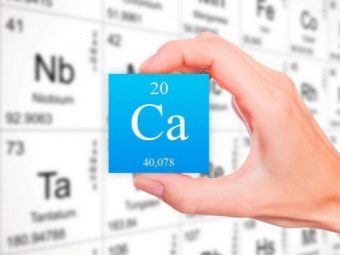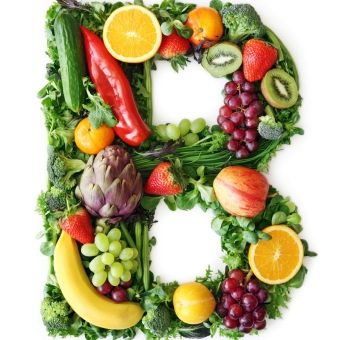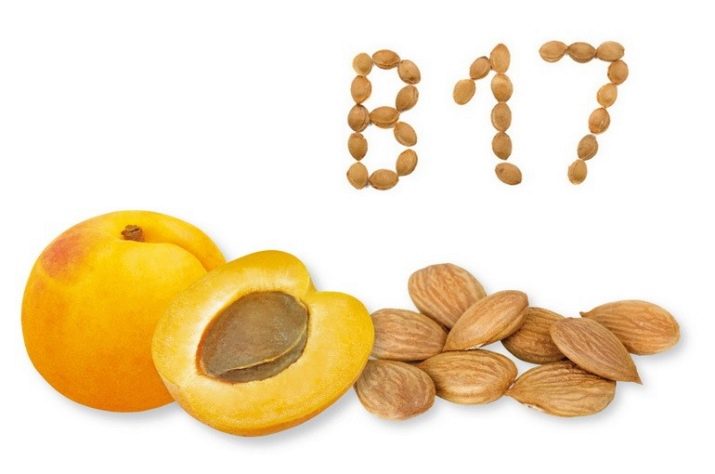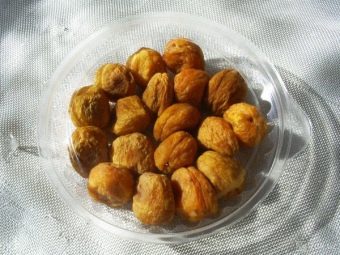Caloric and chemical composition of apricots
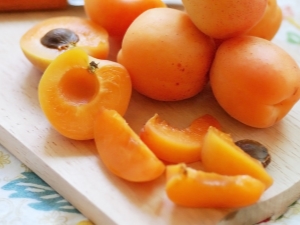
In our time, when a healthy lifestyle was at the peak of fashion, almost every person is engaged in counting calories. Everyone knows which foods cause a catastrophic blow to the figure, and which can be eaten in almost unlimited quantities.However, the situation with fruits is not so simple. Diet lovers often wonder if apricots can be eaten. In this article we will look at the nutritional value of these wonderful fruits.
Special features
Man began to grow apricot trees for at least 6 thousand years. This word can be translated from Latin as “Armenian apple”. Apricot got this name due to the fact that it was in Armenia that the plantations of these fruits were grown from time immemorial. Until now, it is Armenian fruits that are in high demand in the market. They were also actively cultivated in China, India and other warm countries.
These fruits are loved by many since childhood. Besides the fact that they themselves have a rich sweet taste, apricots serve as the basis for the preparation of various desserts: jams, jams, pastes, sauces, fresh juices and even light alcoholic beverages.
Is it really possible to save the figure if you use natural delicacies instead of sweets? In order to answer this question you need to know the calorie content of the fruit and the sweet dishes produced from it.
Composition
Calorie apricots is 44 kcal per 100 grams of product. More specifically, then 1 kcal comes from fats, which are very few in the fruit. Four calories are found in proteins and 39 in carbohydrates. At first glance, this is a completely harmless product for diet supporters. However, it should be borne in mind that apricots contain a lot of sugar, especially in dried fruit. This means that people with diabetes need to limit their use.
All the rest may well be recommended to include this fruit in the menu instead of traditional sweet dishes, because the average fruit weighing 25 grams is only 11 kcal. In addition to low calorie apricot can "boast" the presence of a huge amount of nutrients, making it an even more valuable guest on the table of any person. It contains many elements of the periodic table. 100 grams of product contains:
- potassium - 305 mg;
- calcium - 28 mg;
- phosphorus - 26 mg;
- magnesium - 8 mg;
- sulfur - 6 mg;
- silicon - 5 mg.
In smaller quantities, other elements are also present in apricot: sodium, chlorine, iron, zinc, iodine, copper, manganese, chromium, fluorine, molybdenum, boron, vanadium, cobalt, aluminum, nickel. Finally, apricot is a storehouse of vitamins. First of all, it is rich in vitamin C - 10 mg per 100 grams of product. Here are the remaining vitamins that apricot supplies to the human body:
- beta carotene - 1.6 mg;
- E - 1.1 mg;
- PP - 0.7 mg;
- B5 - 0.3 mg,
- B2 - 0.06 mg,
- B6 - 0.05 mg,
- B1 - 0.03 mg,
- A - 267 mcg
- B9 - 3 mcg
- H - 0.3 mcg.
Other valuable B vitamins, which are rarely found in products such as inositol and B17, are also present in these fruits. The first is good to use for problems with the assimilation of glucose, poor eyesight, skin diseases and even some hormonal disorders in women. And the second, according to scientists, prevents the development of cancer.
As for the nutritional value of the fruit, it is primarily useful for high fiber content - there are 2.1 grams of dietary fiber in 100 grams of the product. Also, it contains 9 g of carbohydrates, 8.3 g of mono- and disaccharides, 1 g of organic acids, 0.9 g of proteins. Quite a few - tenths of a gram, fall on ashes, starch and fats. The last in the fruit is only 0.1 grams. BJU 100 grams of the product is as follows: 2% of the daily requirement of protein, fat - 1% and carbohydrates - 4%.
Here is the approximate calorie content of apricot-based dishes:
- juice and puree - 38 kcal;
- compote - 85 kcal;
- apricot jam - 165 kcal;
- apricot pie - 200 kcal.
As can be seen from this list, the easier it is to prepare a dish of apricots, the less damage it causes to the figure.
Apricot diet
Speaking of apricot and its nutritional value, it is worthwhile to dwell on mono diets based on this tasty and healthy fruit. It has several advantages over other food systems based on a single product.As a rule, by limiting his diet, a person achieves his goal - that is, weight loss, but his health may deteriorate. With apricot mono-diet, it is possible to preserve a healthy complexion, beauty of hair and nails, as it is rich in B vitamins. For women it is especially important to keep an attractive appearance, despite all the dietary restrictions.
Another plus of just such a diet is that apricots are composed of magnesium and phosphorus, and they help the body survive the stress of a poor diet. Another wonderful substance from the composition of apricot is tryptophan, when it enters the body it goes into serotonin, and this is the key to a good mood.
Fruits have another useful feature - when consumed, they are better for removing fluid and harmful cholesterol from the body. As you know, it is very important for losing weight. They gently relax the intestines, which also has a positive effect on body weight. Cleansing the body from the inside - a reliable help in the fight against overweight.
The duration of mono-diets on apricots is from three to five days. To diversify the table a little, you can bake them, puree, make compotes. Supplement the diet can only be mineral water without gas and herbal teas without sugar. Since this diet implies a fractional diet, a handful or two fruits are eaten for food intake. You can lose up to a kilogram of weight a day on a diet. In order not to create unnecessary stress for the body and save the results as long as possible, it should be completed not sharply, but gradually, adding every day for a new product.
Another option, no less useful for losing weight - fasting days. If carried out on apricots, the daily diet will include a kilogram of these fruits. This will help get rid of toxins, toxins, excess fluid in the body.
After receiving only 400 calories, your body will begin to actively connect their fat reserves for energy. As a result, over the summer, for example, spending such fasting days once a week, you can lose 7 kilograms.
Dried fruit
Apricots have a lot of useful properties not only in fresh and canned, but also in dried form. They are stored for a long time and can be used year-round for making compotes and just as a snack. Useful dried fruits such as dried apricots, dried apricots and kaisa are obtained from these fruits.
Dried apricots are halves of seedless dried apricots. Often this product is treated with sulfur dioxide, which allows to increase its shelf life. If dried apricots are of low quality, then when using compotes based on it, it can feel sore throat, and in some cases a headache. Unpleasant sensations can be felt, even if you eat it in its pure form, and one piece is enough. To get rid of the harmful preservative E220, dried fruit must be soaked several times in ordinary water, changing it every half hour.
Kajsa is a solid dried fruit, but the stone is carefully removed from it before drying. As with dried apricots, the caloric content of this product increases to 240 kcal per 100 g of product.
Apricot differs from the above dried fruits in that it is dried right on the trees in the sunlight. It contains the most potassium, which is very good for the heart.
There is another type of dried apricots, which is not so often on sale - it is whispered. Usually these are large fruits and they undergo minimal drying, they can be with and without stones. This product has a lower caloric content than the above species.
Cautions
With all the advantages of the apricot diet, we note that it is not recommended to eat more than 2 kg of fruit a day, as they contain quite a lot of sugar.
Except for days of mono-diet, eating apricots regularly on an empty stomach is not recommended.When used on an empty stomach, the acidity of the secretion increases, and when exposed to other organs of the gastrointestinal tract, this is fraught with discomfort and exacerbations of chronic diseases.
Those who like to eat the kernels of apricots in their raw form should consume no more than 5–7 pits per day. Amigdolin is present in them, and it is cunning because it forms toxic hydrocyanic acid upon digestion. In large quantities this substance can harm the body.
So, apricot can be safely included in the diet menu, as it has a low calorie content, but due to the presence of sugars it is not recommended to eat more than 2 kilograms per day. He can rightfully take a place in your slimness menu and become the product of choice for mono-diets. Apricot is well absorbed by the body and contains a huge amount of vitamins, micro and macro elements.
Remember that in the dried form the caloric content of these fruits increases several times, but the content of some chemical elements, for example, potassium, becomes higher in them.
So that the dried fruits from apricot not only delight you with their rich taste, but also bring exclusively benefits to the body, they are recommended to be soaked in water.
For more on the benefits and harm of apricots, see the following video.





